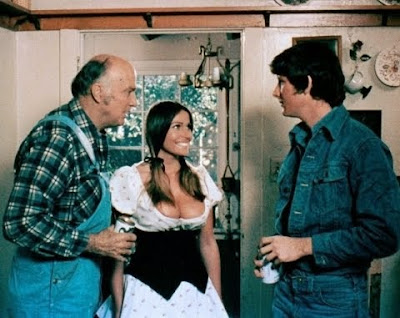The Grand Budapest Hotel
In the book On Directing Film, David Mamet explains that the best way to shoot a scene is to "focus on getting the point of a scene across, rather than simply following a protagonist, or adding visually beautiful or intriguing shots. Films should create order from disorder in search of the objective." His method is evident in HEIST, HOUSE OF GAMES, and throughout pretty much all of his resume. Mamet is all about his dialogue: the words, the inflections, and syntax. The characters in Wes Anderson's movies also speak distinctive, rhythmic dialogue, but walk through some of the most fastidiously designed sets in the history of cinema. Art direction as a beast unto itself. This is one of the reasons I love Anderson's work. For the visually beautiful and intriguing shots.
What would THE GRAND BUDAPEST HOTEL look like if Mamet was its captain? Spare, for certain. Like Anderson, Mamet directs what he writes. They're not directors for hire. The entire process is one animal: from conception to writing to calling for the wrap. Anderson fervently violates Mamet's mantra in each millisecond of his movies, but there is always a logic to the pageantry, a setting wholly appropriate for its players and story. An objective is clear and a unique order is created out of what appears to be disorder of image and narrative. Perhaps never moreso than in his latest movie.
It is the late 1960s. In the Grand Budapest Hotel, located in the fictional republic of Zubrowka, we sit with one Zero Moustafa (F. Murray Abraham) and a man identified only as The Author (Jude Law). Zero is telling the story of how he came to own the now crumbling institution that was once the pearl of Europe, a place where only the most affluent could lodge. The flashbacks begin with events in the early 1930s, when Zero was a mere Lobby Boy/aide-de-camp of Monsieur Gustave H. (Ralph Fiennes, in a beautifully tuned comic performance), the head concierge. Gustave is a world-class fussbucket with his hotel, minding the tiniest details, keeping the staff on the highest alert (like Anderson?). He also keeps his prized guests - fabulously wealthy, blonde, and elderly- satisfied in every possible sense of the word. Madame D (Tilda Swinton, virtually unrecognizable), one of his very favorites, expresses her anxieties of certain death in the near future. Sure enough, shortly thereafter word arrives that the Madame has expired at her home. But it was murder!
Gustave and Zero travel to the opulent home for a will reading and find a group you might expect in the Andersonian universe. Some are relatives; Dmitri Desgoffe-und-Taxis (Adrien Brody) is her angry son. Others are associates; Jeff Goldblum plays a verbose family attorney and Willem Defoe is a wily assassin whose skills will be put to (bloodier than usual for an Anderson pic) much use as he tracks fugitive house butlers and finally Gustave and Zero, who lift a priceless painting called "Boy with Apple", which in an earlier scene was revealed to be bequeathed to the concierge. Eventually, Gustave is charged with the Madame's murder and sent to prison.
At one point, Gustave stops to comment on the complicated plot and remarks, "The plot thickens. Why the soup metaphor?" Indeed it does, with many Anderson alumnae filling supporting roles: Bill Murray, Edward Norton, Jason Schwartzman, Owen Wilson. Harvey Keitel does a very entertaining bit as one of the criminals with whom Gustave escapes (and that sequence is a great nod to the silent films of Harold Lloyd et. al). Seeing these actors scurrying about in the great tradition of the silent clowns, yet firing (sometimes creatively profane) dialogue at a breathless clip is like the icing on one of Mendl's (the exacting pastry boss of Zero's love interest, Agatha) beloved Courtesan au Chocolat cupcakes.
Anderson again creates a world that could only exist in his imagination, yet with real world trappings that I imagine will ring with warm recognition among older viewers familiar with pre-WWII era Europe. The detail is dense and precise, just as we've seen before. Many non-Anderson fans cite the coldness of this grand method of artifice. At times in some of the director's previous films, I could agree. But THE GRAND BUDAPEST HOTEL is played as a near perfect farce, and the meticulous trimmings only brighten the enterprise. It's another piece of art that moves and breathes, and the eye-filling sets and props are vital to its success.
But Anderson also provides contemplative viewers with much to ponder. Familiar themes of nationalism and nostalgia, the latter really being the heart of the story and what drives it all, are explored with a dark wit that is perhaps Anderson's manner of dealing with some very poignant and serious issues. As the elder Zero unloads his bittersweet memories, he doesn't necessarily experience a catharsis, more a bemusement, an acknowledgement of both the healing power and the cruelty of the passage of time. His recollections will mirror (thematically at least) that of many viewers, or vice versa, and perhaps make this film accessible to more audience members than before. But there remains/always is a solemn undercurrent to an Anderson movie. Thorns of a dozen varieties revealing themselves beneath astonishing use of color and generous quirk.
But ultimately, I had so much fun watching THE GRAND BUDAPEST HOTEL I did not want it to end. And after the lively closing credits, I wanted to watch it again.



Comments